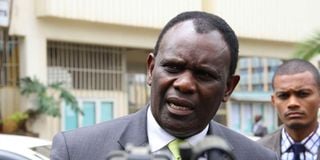Premium
George Muchai murder trial enters 8th year as questions linger

Former Kabete MP George Muchai who was assassinated on a Nairobi street in 2015.
Eight years since Kabete MP George Muchai was killed by a lone marksman outside Nyayo House in Nairobi, his family is still pushing for justice.
This is even as the relatives raise questions on whether the suspects charged by the State are the actual culprits.
His death is one of the unresolved high-profile murders in Kenya.
Mr Muchai was shot dead on the morning of February 7, 2015 while buying newspapers. To date, the State is yet to conclude prosecution of seven suspects arrested shortly after the shooting.
His driver Stephen Ituu Wambugu and his two bodyguards, Mr Samuel Kimathi Kailikia and Mr Samuel Lekakeny Matanta, were also killed.
The incident happened between 3am and 4.30am, where a masked gunman sprayed the MP’s car with bullets.
Although the State arrested seven suspects and charged them in connection with the murder, the family has told the court that it is not convinced they are the actual killers.
“Mr Muchai died in suspicious circumstances and it is difficult to believe the people in court are the real killers. The persons who planned the killing have never been arrested,” family lawyer John Khaminwa told the court in December.
He said the victims are still in trauma and that the incident should be reinvestigated as he claimed that the gunmen could have been hired.
“The victim’s family is not convinced that those before court are the real killers. The big hand in the killing of Muchai is still on the loose,” Dr Khaminwa stated, adding that the family is, however, not for the acquittal of the suspects in court.
Mr Muchai was a trade unionist and his killing caused uproar across the political and labour movements.
The suspects arraigned in court are Eric Isabwa alias Chairman, Raphael Kimani alias Kim Butcheri, Mustapha Kimani alias Musto, Stephen Astiva alias Chokore, Jane Wanjiru alias Shiro, Margaret Njeri and Simon Wambugu.
They are facing four charges of murder at the High Court in Nairobi and 10 counts of robbery with violence at a magistrate’s court.
The robbery with violence case stemmed from alleged carjacking on the fateful night.
The gunman that killed the MP and his aides reportedly stepped out of a stolen car, which had brushed Mr Muchai’s at around 3am on the said night at the Nyayo House roundabout.
He was being driven home from a family gathering at Galileo’s restaurant in Westlands.
Thirty-five witnesses have so far testified and the Director of Public Prosecutions is expected to present six more before closing the murder trial.
The latest prosecution witness is government pathologist Johansen Oduor who told the court that Mr Muchai died from a single bullet fired at close range from a high velocity gun, either a G3 or an AK47.
He said that after conducting a postmortem on the MP’s body, he established that the cause of death was excessive bleeding as a result of multiple injuries because the gunshot entered through the right side of the abdomen and exited at the right nipple. The bullet fractured his ribs.
On the conclusion that it was a close range shooting, the pathologist said the area of gunshot entry was blackened due to fragments of metal and gunpowder.
Another key witness was Mr Stephen Kuria, who testified that the MP’s mobile phone was recovered from Mr Wambugu, one of the suspects, in Kangemi Nairobi.
He and Wambugu were friends. He found the Huawei phone charging at Mr Wambugu’s home.
The High Court has since granted the suspects a bond of Sh700,000 each, with an alternative of depositing a cash bail of Sh500,000.
At the time of his death, Mr Muchai was the deputy secretary-general of the Kenyan Central Organisation of Trade Unions (Cotu).
Three months before his death, Muchai had launched a fight at Cotu over allegations of misappropriation of funds by top officials.
In a petition filed at the Employment and Labour Relations court Milimani Nairobi on November 5, 2014, he alleged that there was embezzlement, misappropriation and mismanagement of workers’ deductions.
Financial impropriety
He also filed a motion seeking several orders including certification of the petition as raising a substantial question of law and to refer the same to the Chief Justice for purposes of constituting and assigning an uneven bench of five judges to hear and determine the matter. Justice Nelson Abuodha dismissed the application on January 30, 2015.
In the suit, he had made allegations of financial impropriety and wanted the court to issue orders to freeze accounts held or associated with Cotu, a forensic audit of those accounts and possible prosecution of those found culpable.
He also wanted a declaration against six top officials of Cotu that failure to apply proper financial management systems in the management of funds and properties of Cotu in accordance with the provisions of the law was in violation of the Constitution.
His death marked the end of the case. In 2015 the Kenya Union of Employees of Voluntary and Charitable Organisations unsuccessfully sought an order that the court allow it to prosecute the petition to conclusion. It had been listed by Mr Muchai as an interested party to the suit.





